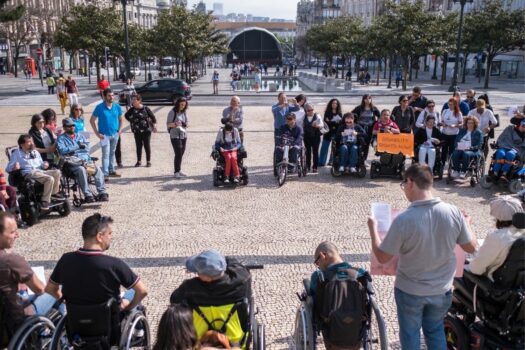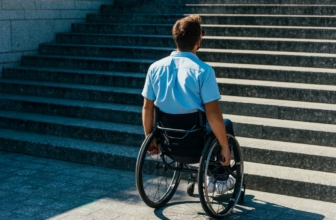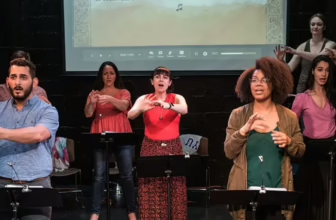In the disability community, peer experts draw on their lived experiences to provide support and advocate for civil rights and equality.
We have a saying in the disability community: “Nothing about us without us.” It means that people with disabilities are the experts on our own lives and have the right to make our own decisions. We are uniquely qualified to support each other and be the leaders of our community. However, our knowledge and skills aren't always recognized and respected.
Disability discrimination is everywhere, from government programs to Google algorithms, but disabled people have persevered. We have fought to have our voices heard over those of parents, medical professionals, and service providers who presume to speak for us despite not having disabilities themselves. We've become a powerful, authoritative group of advocates — peer experts.
What Are Peer Experts?
Peer experts are people with disabilities or mental health conditions who use their lived experience to help others.
All disabled people have valuable experiences to share, but peer experts have reached a point in their disability journey where they are able to be good listeners and offer support to others. Peer experts can range from professionals to volunteers to support group members, and can be found anywhere and everywhere.
Why Disability Lived Experience Is Essential
Disability lived experience is the firsthand knowledge a person can only gain from living with a chronic physical or mental health condition. Our experiences teach us many things non-disabled people can never fully understand if they haven't lived them, including:
- Coping with the life-changing and/or debilitating symptoms of a medical condition, such as pain and limited mobility
- Coping with mental illness symptoms and stigma
- Recovering from an addiction
- Surviving abuse and violence
- Navigating the healthcare system
- Learning to utilize programs and services for the disability community.
- Addressing stereotypes and ableism in everyday interactions
- Developing self-advocacy skills
- Integrating disability into one's sense of self and gaining or regaining self-esteem
- Participating in disability communities and/or advocacy
When disabled people, or any minority or marginalized group of people, tell you what we need, you should listen because our views are grounded in experience. That doesn't mean we all agree on everything or that we can't be wrong, but if we listen to each other and work together, we can make positive change.
What Peer Experts Do
Peer experts are passionate about supporting people who are new to disability or have less privilege through mutual respect and collaboration. They advocate with others, not just for them. Their advocacy is egalitarian in a world plagued by power imbalances between disabled people and the doctors, service providers, and other professionals we must rely on to survive.
Although experience and knowledge are essential in advocacy, it's just as important to know what you don't know. Peer experts understand that disability intersects with race, gender, orientation, and socioeconomic status, and these and other factors can tremendously affect our experiences. True peer experts spend more time listening than talking, do not talk over disabled people from marginalized communities, and support equality and justice for all.
Peer experts choose to be advocates because they truly wish to make others' lives better. They aren't chasing fame or prestige. But like all human beings, their time, knowledge, and labor have value. Peer experts in disability services, mental health, DEI, and other fields deserve to be paid well for their skills and expertise. They should not be relegated to volunteering or expected to work for free because of the historical and ableist view of disability advocacy as charity work.
Formal education is not necessarily required to be a peer expert. The school of life with a disability teaches the most valuable lessons when it comes to doing peer support. However, if you choose advocacy as a career and obtain relevant education and training, you can become a peer professional and gain more power to create change.
Why We Need Peer Support in the Disability Community
To understand why peer experts are so important, we must discuss the ways disabled people are harmed by the people, programs, and facilities that are supposed to help us. This form of oppression is known as systemic ableism.
People with disabilities are routinely forced to live in nursing homes and institutions, paid subminimum wages, and relegated to poverty by disability benefits. We struggle to access healthcare, housing, transportation, and employment. We are treated badly by some doctors who judge us or assume we have a poor quality of life. On top of all that, the very programs and people who perpetuate these abuses often claim they are helping us and know what we need better than we do.
In the 1960s, disability activists pioneered the peer support model of disability, the idea that we should be the ones helping each other. We have the right to decide where and how we want to live in the community. We deserve to have our civil rights respected. Yes, having a disability is often hard, but we are not broken, and we can have great lives with the right supports and services.
The peer support model shifts the power to disabled people and affirms our worth as human beings. Non-disabled people can be great allies, but they don't fully understand what it's like to be us, even if they have a disabled family member. We need each other, and we must be the ones sharing our stories and advocating for our rights.
How to Become a Peer Expert in the Disability and Mental Health Community
If you have the skills and desire to advocate for the disability community, you can become a peer expert. Here are some tips to get started.
Learn about diverse disability experiences.
People with disabilities are the largest minority. We are everywhere and everywhere, and that means we can have vastly different experiences based on where we live, our racial and cultural background, socioeconomic status, gender, sexual orientation, and other factors. If you want to be a peer expert, you must recognize that your most important role is to listen and learn from others. You're a peer, not a superior. You have knowledge to share, but so do they. Don't push unsolicited advice on people or assume that what works for you will help everyone.
Share your lived experiences online and offer support in forums and support groups.
Everyone has a story, and yours can help someone. You can dip your toes into the peer support world simply by writing articles for sites like The Ability Toolbox and participating in disability support groups, Facebook groups, subReddits, and other online communities.
Join a disability advocacy or support group in your city.
Most cities and towns have disability advocacy groups that work to improve accessibility and make the community more inclusive. If your area has a Center for Independent Living or NAMI chapter, they may be looking for volunteers or have committees you can join. Adapted sports can be a great way to meet other disabled people with common interests. You can also join arts-based support groups such as drama or art therapy, writing, or music.
Volunteer with an organization where your disability or mental health lived experience can be helpful.
Just about every nonprofit organization has clients with disabilities, but they may not always know how best to support them, especially if they don't have disabled staff or volunteers. You can be the person their disabled clients need to feel welcomed and understood.
Consider a career as a peer professional.
If you find that advocacy is your calling, you can work within or outside the system to make a difference while earning a living. Medical clinics, government agencies, nonprofit organizations, and businesses need disabled staff members to improve their services to clients with disabilities.

Career Opportunities for Peer Professionals
Disabled peer professionals can be found everywhere, from large corporations to government agencies to local community groups. The following are just a few of the numerous careers involving disability and peer support.
Centers for Independent Living
The Independent Living movement is the original peer support model in the disability community. It's rooted in the philosophy that disabled people are the experts on our own lives and have the right to make our own choices.
Beginning in the 1960s, disability activists fought to close abusive institutions and empower disabled people to live in our own homes and communities. They established Centers for Independent Living to help people with disabilities access crucial resources and services such as housing, transportation, in-home support workers, employment opportunities, and more.
There are now more than 400 Centers for Independent Living in the United States, all staffed by peer support specialists with disabilities. You can visit the National Council on Independent Living website to find a center near you.
ADA Coordinators and Consultants
Certified ADA Coordinators work with businesses, educational institutions, and nonprofit organizations to ensure that they are complying with the Americans with Disabilities Act and creating a welcoming environment for disabled people.
Accessibility consultants may work on a freelance or full-time basis to improve disability inclusion and develop new products, services, and programs.
Assistive Technology and Digital Accessibility
If you're interested in engineering or computer science, your lived experience plus education and skills could make you a valuable employee. You could work in software development, UI and UX design, video game development, medical device design, or assistive technology — high-paying jobs that don't require physical strength and can often be done remotely.
Vocational Rehabilitation Counselors
Vocational rehabilitation counselors help people with disabilities find and keep jobs. They assist clients with obtaining education, transportation, job coaching, accessible housing, and more. VR counselors are employed by state Department of Vocational Rehabilitation agencies that are overseen and partially funded by the federal Department of Education.
Peer Support Specialists in the Mental Health Community
Peer support specialists are people with mental illnesses who work in the mental health field. Peer specialists use their lived experiences in combination with skills training and supplemental education to support people who are experiencing similar struggles. Peer support specialists help to reduce the hierarchical nature of mental healthcare that can leave people feeling condescended to and misunderstood.
Alcohol and Drug Abuse Counselors
Many states have Alcohol and Drug Abuse Counseling certification programs that offer a career path to people in substance use recovery. Professional training combined with lived experience make certified substance use disorder counselors uniquely qualified to support those who are new to sobriety.
Psychotherapists and Social Workers
People with disabilities and chronic illnesses often struggle to find a therapist who understands their experiences. If you're patient and empathetic, you could make a difference in many lives by pursuing a career in psychology or social work.

Writers, Journalists, and Social Media Influencers
Many peer experts choose to share their knowledge by starting a blog, writing for disability websites, or creating videos on YouTube, TikTok, and other platforms. For example, The Ability Toolbox is a website created by and for people with disabilities and mental health conditions to discuss our experiences and share practical solutions for everyday problems.
Disabled content creators deserve to get paid like everyone else, but as with any content on the internet, use your due diligence and don't believe everything you see, hear, and read. Make sure the websites and social media accounts you follow are truly part of the disability community, and not run by non-disabled people who are using us for profit, pity, or inspiration. Miracle cures don't exist — if something seems too good to be true, it probably is.
How You Can Support Peer Experts
Whether you have a disability or not, you can help create change for our community by supporting our peer experts.
Hire disabled people.
If a person with a disability applies for a job at your company, and they are qualified, hire them. You'll be making a smart business decision — studies show that people with disabilities are reliable, hard workers who are more likely to stay at their jobs. Employees with disabilities can bring a unique perspective to the workplace and help make your company more diverse and inclusive.
Support disabled-owned businesses.
Many disabled people pursue entrepreneurship due to employment discrimination or the desire to tailor our jobs to our abilities and schedules. By supporting disabled-owned businesses, including The Ability Toolbox, you show that you recognize our abilities and value our skills. To find disabled-owned businesses, check out our directory.
Showcase the value of peer experts in your writing and work.
If you're a journalist writing about disability, interview disabled people. If you're a scientist or academic doing research, focus on the experiences of disabled people. If you're developing a product or service for the disability community, involve disabled people in the development and testing process. Even if your article, research, product, or service isn't about disability, include disabled people to make sure it's accessible to us. Include us in anything that affects our lives — in other words, everything!
Use the term “peer experts” when you write, research, and talk about disability.
Explain why disabled people's perspectives carry authority and must be prioritized when it comes to issues that affect us. Talk about systemic ableism and why we must center disabled voices. Together, we can uplift the disability community through the power of peer support.

Founder and Editor-in-Chief of The Ability Toolbox. I received my BA in English from Stanford University and MA in Clinical Psychology from Antioch University Los Angeles, and have worked in entertainment and health media for over 20 years. I also blog about traveling with a disability. As a wheelchair user with cerebral palsy, I am deeply committed to amplifying the voices of the disability community through writing and advocacy.








Start the discussion at community.theabilitytoolbox.com